Between Socrates and the Many
Between Socrates and the Many
A Study of Platos Crito
J. Michael Hoffpauir
LEXINGTON BOOKS
Lanham Boulder New York London
Published by Lexington Books
An imprint of The Rowman & Littlefield Publishing Group, Inc.
4501 Forbes Boulevard, Suite 200, Lanham, Maryland 20706
www.rowman.com
6 Tinworth Street, London SE11 5AL
Copyright 2020 by The Rowman & Littlefield Publishing Group, Inc.
All rights reserved. No part of this book may be reproduced in any form or by any electronic or mechanical means, including information storage and retrieval systems, without written permission from the publisher, except by a reviewer who may quote passages in a review.
British Library Cataloguing in Publication Information Available
Library of Congress Cataloging-in-Publication Data Available
ISBN 978-1-4985-8529-3 (cloth : alk. paper)
ISBN 978-1-4985-8530-9 (electronic)
 TM The paper used in this publication meets the minimum requirements of American National Standard for Information Sciences Permanence of Paper for Printed Library Materials, ANSI/NISO Z39.48-1992.
TM The paper used in this publication meets the minimum requirements of American National Standard for Information Sciences Permanence of Paper for Printed Library Materials, ANSI/NISO Z39.48-1992.
To my mother, Kathleen Ackermann Hoffpauir,
and the memory of my father, Jay Allman Hoffpauir
Copyright 2020. Lexington Books. All rights reserved. May not be reproduced in any form without permission from the publisher, except fair uses permitted under U.S. or applicable copyright law.
EBSCO Publishing : eBook Collection (EBSCOhost) - printed on 3/11/2020 6:36 AM via MCGILL UNIV
AN: 2322609 ; Hoffpauir, J. Michael.; Between Socrates and the Many : A Study of Platos Crito
Account: s1226075
Acknowledgments
If not for James H. Nichols Jr. and Mark Blitz at Claremont Graduate University, I would not have come to appreciate the importance of the work of Plato as I now do, nor would I have come to see the questions and problems raised by political philosophy in a matter of fact way, that is, in terms of what they reveal about me, for better or worse, as son, brother, friend, husband, and citizen. I would like to thank Ellis Sandoz for treating me so well for so many years. If it were not for Nichols, Blitz, and Sandoz, I could not understand, as I now do, the importance of good teachers. Finally, I would like to thank C. Bradley Thompson and the Clemson Institute for the Study of Capitalism for their support and for giving me my academic home.
I would like to thank my friends for their support over the years, and I would be remiss if I did not mention Matthew Noland, Derek Wood, Jeffrey Bacon, Ryan Williams, Lindsay Eberhardt, Robert Garrow, Bradley Jensen, Kathleen OToole, Dan OToole, and Giorgi Areshidze by name. Further, I must thank my wife, Petria A.F. Hoffpauir, for everythingwell, almost everythingfor I must also thank my parents, Jay and Kathleen Hoffpauir.
Permissions
I would like to thank Cornell University Press for granting me permission to reprint portions from: Four Texts on Socrates: Platos Euthyphro, Apology of Socrates, Crito, and Aristophaness Clouds, Revised Edition, translated by Thomas G. West and Grace Starry West. Copyright 1984 by Cornell University Press. Revised Edition 1998 by Cornell University Press. Reprinted by permission of the publisher. All rights reserved.
I would like to thank Hackett Publishing Company for granting me permission to reprint portions from: Plato, Euthydemus, translated by Gregory A. McBrayer and Mary P. Nichols (Newburyport, MA: Focus Publishing, 2011). Reprinted by permission of Hackett Publishing Company, Inc. Copyright 2011 by Gregory A. McBrayer, Mary P. Nichols, and Denise Schaeffer. All rights reserved.
I would like to thank Hackett Publishing Company for granting me permission to reprint portions from: Plato, Phaedo, translated by Eva Brann, Peter Kalkavage, and Eric Salem (Newburyport, MA: Focus Publishing, 1998). Reprinted by permission of Hackett Publishing Company, Inc. Copyright 1998 by Eva Brann, Peter Kalkavage, and Eric Salem. All rights reserved.
EBSCOhost - printed on 3/11/2020 6:36 AM via MCGILL UNIV. All use subject to https://www.ebsco.com/terms-of-use
Chapter 1
Taking Crito Seriously
This study of Platos Crito is about Platos character, Crito, the arguments Crito advances, the arguments that fail, and the arguments that move Crito to see that Socrates ought not to escape his death sentence. There is no shortage of literature on the Crito, and while several studies offer insight into the dialogue, their focus is not the dialogues namesake, but Socrates. Although one need not presume that the Crito presents such an argument in full, most scholars study the Crito to try to understand why Socrates chooses to meet his death. Many conclude that the laws speech demanding obedience is his genuine reason for doing so. While most of this literature wrestles with Socrates death and looks to the Crito for explanation, it does not wrestle with the question Plato places on the very surface of the dialogue: why name this dialogue after Crito?
By naming the dialogue Crito, Plato gives reason to ask what this Athenian gentleman, a man moved by popular opinionsopinions that move men to this dayreveals about politics when the relationship between the citizen and the city turns deadly. More importantly, this title gives reason to ask what Critos desire that Socrates escape death reveals about Crito himself, about his relationship with philosophy, and about his relationship with politics. Furthermore, if one finds a kinship between ones desires or opinions and Critos desires or opinions regarding what Socrates ought to do, then one ought to ask what this reveals about oneself, about ones relationship with philosophy, and about ones relationship with politics. These questions matter not only because Critos desires, opinions, and understanding of justice still have purchase today but also because philosophy enjoys an exalted position among many and because cities continue to punisheven killthose whom they determine to be their enemies.
In attempting to convince Socrates to escape jail, Crito makes his argument in terms of justice. For him, justice is self-preservation and doing good to friends and harm to enemies. Critos argument fails to convince Socrates to escape, and, by the end of the dialogue, he has nothing to say. Crito is reduced to silence not by an argument about which opinions he ought to obey, nor by an argument that living well is most important, nor by an argument against doing injustice or evil, nor by an argument that one ought to do the just things that one agrees to do. Rather, Crito is reduced to silence by the laws argument that, because justice is unequal between them, because he has chosen to obey, and because escape is futile, Socrates must obey.
Critos opinion that justice is self-preservation and doing good to friends and harm to enemies reveals the divide between the philosopher and the overwhelming majority of human beings. According to Crito, it is unjust to betray oneself by giving ones enemies their wish and suffering harm (Crito 45c6-10). For Crito, justice demands that those who suffer harm or injustice do injustice in return. According to Socrates, one must never do or return injustice or evil, no matter what one suffers (Crito 45d5-e1). There is no common counsel to be had between those who hold these opposing opinions, and each views the counsel of the other as unmanly and unjust. Critos all-too-natural view of justice exposes the rarity of the philosopher, the injustice of most cities, and the injustice of the vast majority of human beings.
Next page
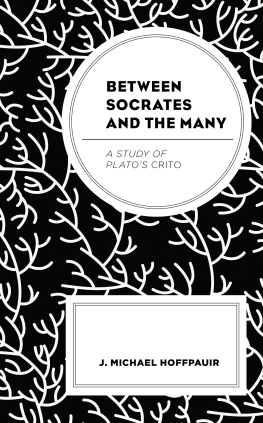
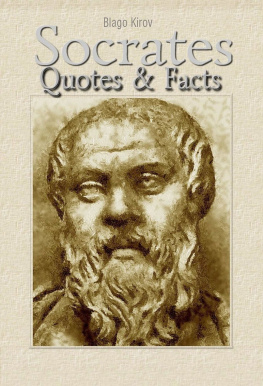
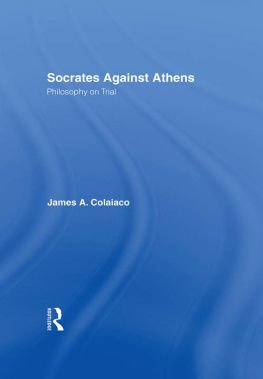

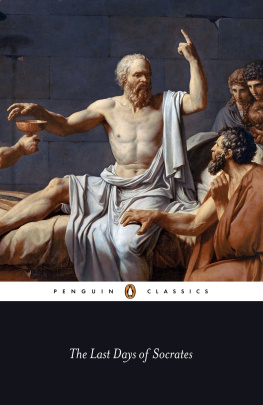
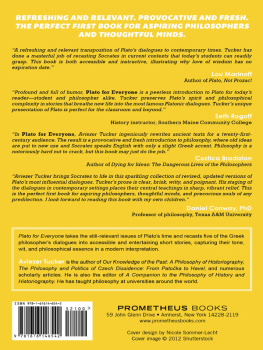
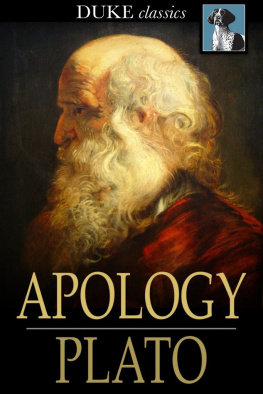
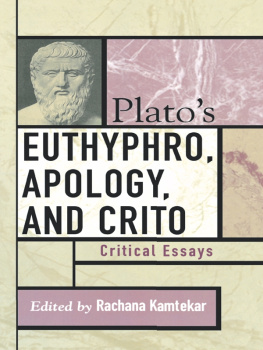
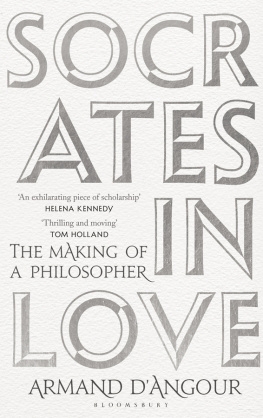
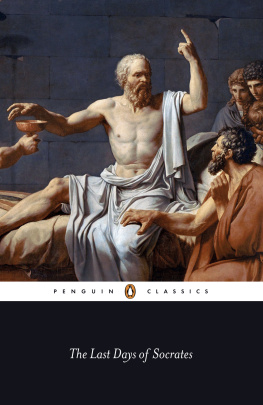
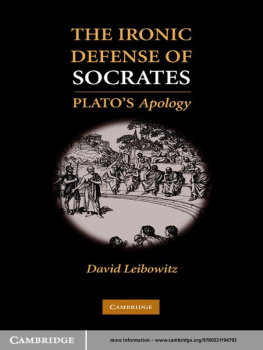
 TM The paper used in this publication meets the minimum requirements of American National Standard for Information Sciences Permanence of Paper for Printed Library Materials, ANSI/NISO Z39.48-1992.
TM The paper used in this publication meets the minimum requirements of American National Standard for Information Sciences Permanence of Paper for Printed Library Materials, ANSI/NISO Z39.48-1992.